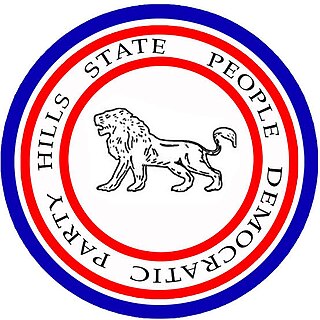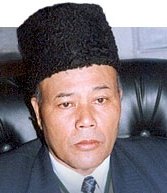Related Research Articles

The Hill State People's Democratic Party (HSPDP) is a regional political party active in the state of Meghalaya, northeast India. Formed in 1968 as a split from the All Party Hill Leaders Conference by Hopingstone Lyngdoh, the HSPDP has had representatives in the Meghalaya Legislative Assembly since the Assembly's first elections in 1972. The HSPDP has been a junior member of coalition governments in Meghalaya on a number of occasions and following the 2018 election joined the National People's Party-led government of Chief Minister Conrad Sangma.
Shri Hoping Stone Lyngdoh was an Indian politician who was the president of the Hill State People's Democratic Party (HSPDP), one of three official political parties of the state of Meghalaya in India. He was the son of late Hajur Shon; was born at Nonglait Village, West Khasi Hills District on March 15, 1929; he studied at St. Anthony's College, Shillong.
The Meghalaya Democratic Party (MDP) is a political party in the north-east Indian state of Meghalaya formed in 2002. The party formed as a split from the United Democratic Party.
Brington Buhai Lyngdoh or B. B. Lyngdoh was former Chief Ministers of Meghalaya, a state in north-eastern India. He was born at Laitlyngkot, a village twenty-five kilometres away from Shillong, on 2 February 1922. He is one of India's most well known statesman and is often referred to as the 'Father of coalition politics'. B. B. Lyngdoh was one of the prominent leaders on Meghalaya's Hills State movement.

The National People's Party is a national-level political party in India, though its influence is mostly concentrated in the state of Meghalaya. The party was founded by P. A. Sangma after his expulsion from the NCP in July 2012. It was accorded national party status on 7 June 2019. It is the first political party from Northeastern India to have attained this status.
Williamson Ampang Sangma, was a Garo leader, and the first Chief Minister of Meghalaya. He was also the first Governor of Mizoram among the Garos in 1989.

Dr. Flinder Anderson Khonglam was an Indian politician and physician. He served as the eighth Chief Minister of Meghalaya from 2001 to 2003. Khonglam was the first independent legislator to serve as the Chief Minister of any Indian state in history.
Evansius Kek Mawlong was an Indian politician who served as the Chief Minister of Meghalaya from 8 March 2000, until 8 December 2001. He was the main architect in the formation of the United Democratic Party in Meghalaya and was its Founding President.
The North-East Democratic Alliance is a political coalition that was formed on May 24, 2016, by Bharatiya Janata Party. The motive of the new political front was to unite non-Congress parties in Northeast India. Himanta Biswa Sarma was appointed as the convenor of the front.
The major national political parties in the state of Meghalaya are the Indian National Congress (INC) and the Bharatiya Janata Party (BJP).
The Public Demands Implementation Convention (PDIC)[b] was a regional political party in Meghalaya, India founded in 1977 and primarily focussed on the interests of farmers, especially those growing potatoes in the Khyrim area of the Khasi Hills. The party was a split from the All Party Hill Leaders Conference.
The 1972 Meghalaya Legislative Assembly election was held on 9 March 1972. These were Meghalaya's first Legislative Assembly elections, following the creation of the state on 21 January 1972. 59 men and one woman, Percylina Marak, were elected.
The 1978 Meghalaya Legislative Assembly election was held on 25 February 1978. No party secured a majority of seats in the election. Following negotiations, a coalition government, known as the Meghalaya United Legislative Party, was formed between the All Party Hill Leaders Conference, the Hill State People's Democratic Party and the Public Demands Implementation Convention (PDIC). Due to an inability to reach agreement between the coalition parties, the position of Chief Minister was chosen by drawing lots; subsequently, on 10 March 1978, Darwin Diengdoh Pugh was sworn in as the state's second Chief Minister. Miriam D Shira from Garo Hills was the only woman elected to the legislature.
The 1983 Meghalaya Legislative Assembly election was held on 17 February 1983. No party secured a majority of seats and no women were elected. A coalition named the Meghalaya United Parliamentary Party was formed by the All Party Hill Leaders Conference (AHL), the Hill State People's Democratic Party, the Public Demands Implementation Convention (PDIC) and two independent members. On 2 March 1983 the coalition presented B. B. Lyngdoh from AHL as Chief Minister. However, the coalition only lasted 29 days and on 2 April a new coalition, the Meghalaya Democratic Forum, was formed with the Indian National Congress (INC) in the lead. W. A. Sangma of the INC was appointed Chief Minister.
The 1988 Meghalaya Legislative Assembly election was held on 2 February 1988. In the lead up to the election, sporadic violence targeted at the Indian Nepali population of the state occurred. No party secured a majority of seats and two women were elected.
The 1998 Meghalaya Legislative Assembly election was held on 16 February 1998.

Legislative Assembly elections were held in Meghalaya on 27 February 2023 to elect all 60 members of the Meghalaya Legislative Assembly. The votes were counted and the results were declared on 2 March 2023.
Elections in the Republic of India in 1978 included elections to seven state legislative assemblies.
Shakliar Warjri is an Indian politician from Hill State People's Democratic Party (HSPDP). He is member of the Meghalaya Legislative Assembly from Mawthadraishan.
References
- 1 2 Lewis, David S.; Sagar, Darren J. (1992). "Hill People's Union". Political Parties of Asia and the Pacific: A Reference Guide. Longman. p. 110. ISBN 9780582098114.
- ↑ "Khongwir recollects a regional alliance that did not last". The Shillong Times. 7 July 2017. Archived from the original on 21 February 2018. Retrieved 21 February 2018.
- ↑ "East of Eden". The Illustrated Weekly of India. Vol. 111, no. 1–12. 1992. p. 32.
The three major regional parties in Meghalaya — the Hill People's Union, the Hill State People's Democratic Party and the Public Demands Implementation Convention — formed the Regional Democratic Front before the Lok Sabha elections and parliamentary elections in November 1989.
- ↑ Menon, Ramesh (29 February 1988). "Rough time for minority Congress(I) ministry in Meghalaya". India Today Magazine. Retrieved 21 February 2018.
- ↑ Turner, Barry, ed. (2016). "Meghalaya". The Statesman's Yearbook, 1998–99. Springer. ISBN 9780230271272.
- ↑ Warjri, Antarwell (2017). "Role of Regional Political Parties and Formation of the Coalition Governments in Meghalaya" (PDF). International Journal of Humanities & Social Science Studies. 3 (5): 210.